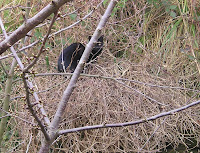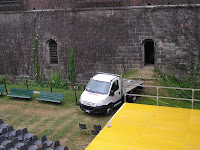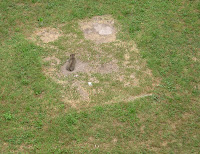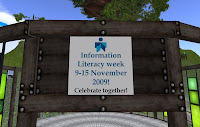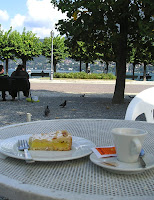I've still got a couple of items from the
IFLA/ World Library and Information Conference that took place in August in Milan, Italy (the photo is taken in Milan Castle, no. 1 in my "spot thre cat" series, watch out for more). I took a lot of notes at the e-learning session but I'm not sure all of them are relevant, so I'll just note two, but link to all the papers at the end.
Lesley Farmer talked about
Library e-learning spaces. She distinguished between formal/ informal learning and virtual learning (which could be either). She also talked about meanings of space, including space inside people's minds and "needing space". She listed some different approaches to teaching, and also aspects of learning spaces e.g. that they facilitate peer to peer and group learning, or support individual work, or are immersive, or include simulation. Lesley referred to supporting theories e.g. social costructivist, situated learning, environmental psychology, Vygostky's ideas and Kolb's experiential learning theory (his learning cycle).
Lesley identified that you need different environments "to support knowledge sharing" in different ways e.g. delivering, applying, communicating information, or decision making. These ideas apply in e-learning as in other kinds of learning. She identified the need for flexibility, decentralisation (moving between venues etc.), ergonomic comfort, making the environment stimulating to the senses (sight, sound), and having ubiquitous technology (e.g. enough power sockets - unlike the conference centre!)
Some features that she felt fostered "community-based learning" were communication surfaces (such as smartboards, walls you can write on etc.), open areas with flexible furniture and joint work space & flexible lighting. I will say that at Sheffield, there are spaces like this in our Information Commons (
http://www.shef.ac.uk/cilass/learning-spaces) although not enough of them!
Peter Wynne presented instead of Bob Glass. He was looking at whether LIS professionals were getting enough ICT and elearning training and what the picture was in the UK. Their university, Manchester Metropolitan, is part of Web-based Information Science Education (WISE) , which offers online short courses ("a method of filling spare capacity"):
http://www.wiseeducation.org/. They did a small online survey, with 10 higher education libraries and 3 public library authorities responding. There were huge differences in training budgets an informal response from a public library was "what training budget?" Many said that library staff training budgets had remained static or decreased. The most popular area for training was Web 2.0, elearning packages, and information literacy. The skills gaps did not seem to be with new graduates, so it seemed like it was established staff rather than recent recruits who needed training.
These are the links to the papers
- LESLEY FARMER (California State University Long Beach, Long Beach, USA)
Library e-learning spaces.
http://www.ifla.org/files/hq/papers/ifla75/214-farmer-en.pdf- BOB GLASS (Manchester Metropolitan University, Manchester, UK)Training for
Information Professionals in ICT's, e-learning and related issues: what can library schools do to help (not the paper that was actually delivered!)
http://www.ifla.org/files/hq/papers/ifla75/214-glass-en.pdf- BAU-MEI CHENG
E-learning for the librarians in Taiwan: the experience at the National Central Library's E-learning campus http://www.ifla.org/files/hq/papers/ifla75/214-cheng-en.pdf- IDA A. JOINER (Carnegie Library of Pittsburgh, Pittsburg, USA)
If we 'e' it, will they come? Lifelong e-learning at a large urban public library? http://www.ifla.org/files/hq/papers/ifla75/214-joiner-en.pdf 






